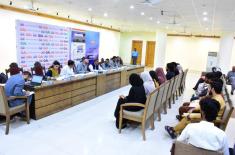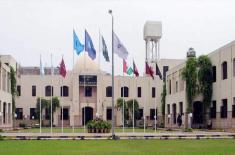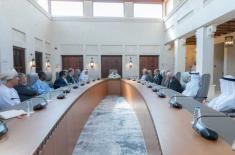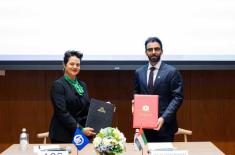
NCRC Launches Two Landmark Reports On Children, Minority Rights In KP
Muhammad Irfan Published September 30, 2025 | 05:40 PM

PESHAWAR, (UrduPoint / Pakistan Point News - 30th Sep, 2025) The National Commission on the Rights of Child (NCRC) unveiled two major publications at a provincial event in Khyber Pakhtunkhwa on Tuesday: The State of Children in Pakistan 2024 and the Situational Analysis of Children from Minority Religions in Pakistan.
The gathering brought together senior government officials, civil society members, academics, law enforcement representatives and international organizations.
Presenting The State of Children in Pakistan 2024, Maham Afridi, Program Coordinator at NCRC, described it as a comprehensive assessment of children’s health, education, protection, and participation.
“This report fills critical data gaps and offers actionable recommendations already under review with Federal and provincial authorities. It is not just a document, but a roadmap to ensure every child in Pakistan enjoys their rights,” she said.
Sharing the second publication, Pirbhu Satyani, NCRC Member (Sindh/Minorities), underscored the systemic discrimination faced by children from minority religions.
“The report highlights challenges in education access, protection from violence, and equal participation. It is a call to action for all stakeholders to ensure inclusivity, equality, and dignity for these children,” he stressed.
A panel discussion followed, focusing on the impact of education, child labour, and forced conversions on children, particularly those from minority communities.
The session was moderated by Mr. Satyani.
Ijaz Khan, Deputy Chief of the KP Child Protection & Welfare Commission, emphasized localized solutions:
“Protecting children requires strong provincial mechanisms. We need to strengthen referral pathways, improve institutional coordination, and ensure laws are fully implemented.”
Aneela Naz, Additional IG (Gender & Human Rights), underlined law enforcement’s role:
“The police are committed to safeguarding all children, but continuous training, resources, and sensitivity are essential, especially in addressing child labour, abuse, and forced conversions. The voices of minority children must be heard and acted upon.”
Habib Afridi, Deputy Secretary of the Auqaf, Hajj, Religious & Minority Affairs Department, highlighted the invisibility of minority children in policymaking:
“Minority children are often excluded from policy frameworks. This must change. Every child, regardless of faith, deserves equal access to education, protection and opportunities.”
Concluding the event, Ijaz Khan reiterated the importance of joint responsibility:
“Protecting children is not the responsibility of one institution alone; it requires collective action from government, civil society, law enforcement, and communities. Only by working together can we create a safer and more inclusive future for every child in Pakistan.”
Recent Stories

Women leaders share tech stories at Women in Technology Forum

Dubai PodFest 2025 brings together leading Arab podcasters to explore sector’s ..

UoG scholarships ,support 3800 students

UHS launches structured house job for DPT graduates

Open Masters Games Abu Dhabi 2026 spotlights sports as catalyst for health, incl ..

Sharjah Ruler chairs Arab Theatre Institute council meeting

Al Dhafra Dates Festival & Auction to launch on 17 October in Madinat Zayed

'Mohammed bin Rashid Government Fellowships' initiative launched in collaboratio ..

World Governments Summit, Association of Caribbean States sign Partnership Agree ..

UAE takes part in International Astronautical Congress 2025

Abu Dhabi economic delegation visits US to boost investment

Fujairah to host 13th Energy Markets Forum tomorrow
More Stories From Pakistan
-
Two KP Minister resigns from cabinet
12 minutes ago -
Commissioner Rawalpindi directs strict action against profiteering in flour, roti prices
12 minutes ago -
NCRC launches two landmark reports on children, minority rights in KP
12 minutes ago -
Dr. Umair becomes Pakistan’s sole member of International Emmy Awards Academy
12 minutes ago -
Chairperson PWPA Hina takes notice of acid attack incident in Liaquatpur
12 minutes ago -
DPO suspends four SHOs
12 minutes ago
-
Over 1m govt service requests delivered to citizens via 'Maryam Ki Dastak'
12 minutes ago -
DC opens veterinary dispensary in Kiror Lal Eisan
22 minutes ago -
DC visits Nankana to review development projects
22 minutes ago -
Barrister Amjad inaugurates modern OPC facilitation centre at The Mall road
22 minutes ago -
CM Bugti urges youth to counter anti-state propaganda, honors martyrs
22 minutes ago -
FO orders revival of original documents of people destroyed in floods
32 minutes ago